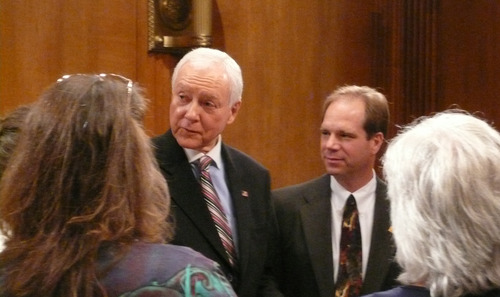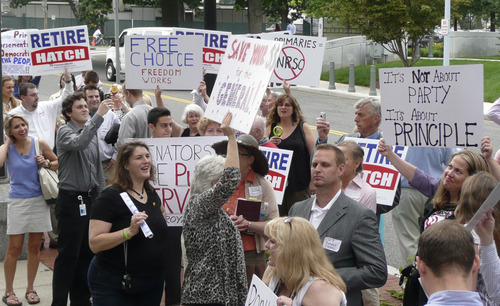This is an archived article that was published on sltrib.com in 2011, and information in the article may be outdated. It is provided only for personal research purposes and may not be reprinted.
Sen. Orrin Hatch voted in favor of No Child Left Behind and has supported the education law in the face of angry state lawmakers and teachers groups for almost a decade.
But no more.
Earlier this month, Hatch not only voted against a revamp of the much-maligned law, he also was one of three Senate education committee members who voted to scrap it altogether.
"The current law just hasn't worked like we hoped it would," he told The Tribune in an interview. "I gave No Child Left Behind the benefit of the doubt, but frankly, while my vote was motivated by the best of intentions, it ended up being too much of a straitjacket."
Tea party activists have criticized Hatch for voting in favor of President George W. Bush's signature education law, saying it expanded the federal bureaucracy and weakened state control of the education system.
But Hatch said his newfound opposition to the law isn't a reaction to political opponents, who are trying to defeat his 2012 re-election bid, though they have had a hard time persuading conservatives to jump in the race.
"Long before anybody started to raise it in this election, I came to the conclusion that I could not support it again," Hatch said. "I'm not against changing my viewpoint."
If Hatch did change his mind, he appeared to do so after January 14, 2009. That day, he took to the Senate floor to honor Bush's presidency.
"He delivered education reform with the No Child Left Behind Act and I can tell you what a difference it has made," Hatch said in that speech. "Lives are changed, hopes are kindled and futures are brighter as a result. Empowering teachers to help students meet higher expectations works."
A month after that speech, tea party protests started in cities like Chicago and Washington, D.C. and by the end of the year grew into a political movement that has redirected the Republican party.
Since then, Hatch has distanced himself from four votes he made that have drawn attacks from the Utah tea party. Beyond No Child Left Behind, Hatch has voted against the latest version of the Dream Act, which would create a path to citizenship for some undocumented children, and the Children's Health Insurance Program. He has also said he regretted his vote for the Troubled Asset Relief Program, or TARP.
In all four instances Hatch has said the programs have morphed into something he could not support.
"Once the bureaucracies in the federal government like the Department of Education get their hands on something, they just can't help themselves," he said. "They just want to get more and more power."
State Sen. Margaret Dayton, R-Orem, has no interest in analyzing Hatch's motivations for opposing No Child Left Behind. She's just glad he is now on her side, after recalling disagreements on the issue over the years.
"If he has come to that realization, I applaud that change of direction," she said.
Dayton has been Utah's fiercest opponent of the education law, which requires yearly testing on reading, writing and math with the goal of getting every student in America on grade level by 2014.
"It set everybody up for failure," she said. But most onerous to Dayton was federal intrusion into what has always been a state issue. She led repeated efforts to reject the law and its federal funding, though the state Legislature balked.
Her solution is getting the federal government out of education policy entirely and Hatch seemed to be on the same page, saying: "I think the government … ought to get their mitts off of local and state education."
Tim Bailey, a middle school history teacher in Salt Lake City, agrees that the goal of No Child Left Behind was unobtainable, but said people shouldn't ignore the benefits of that law.
He said the law has helped students performance and highlighted the needs of some minority populations who were largely ignored by the education establishment.
Unlike Dayton, Bailey believes the federal government does have a role in education, particularly in ensuring the states are taking care of traditionally under-served groups. He is following the new bill in Congress and likes the requirement that schools make annual progress toward grade-level proficiency, rather than setting a hard deadline when every student must reach that goal.
"A growth model is a much more fair standard instead of saying everyone will be on grade level," the Northwest Middle School teacher said.
While he says No Child Left Behind was "ill-thought through," Bailey said one aspect was pure genius — its name.
"Were you going to be the senator who stood up and said, 'I'm going to be the one who leaves children behind' ?" he asked.
Hatch wasn't and only a few were willing to do so. Bush's education law sailed through Congress in 2001. The only member of Utah's delegation opposed to it was former Sen. Bob Bennett. Rep. Rob Bishop, R-Utah, a former school teacher, has been a consistent opponent of No Child Left Behind, but he wasn't in Congress when the law was first approved.
Now a decade later, Congress needs to reauthorize the legislation but is moving slowly.
The bill is now before the Senate, but the House has taken no significant action.
Twitter: @mattcanham





